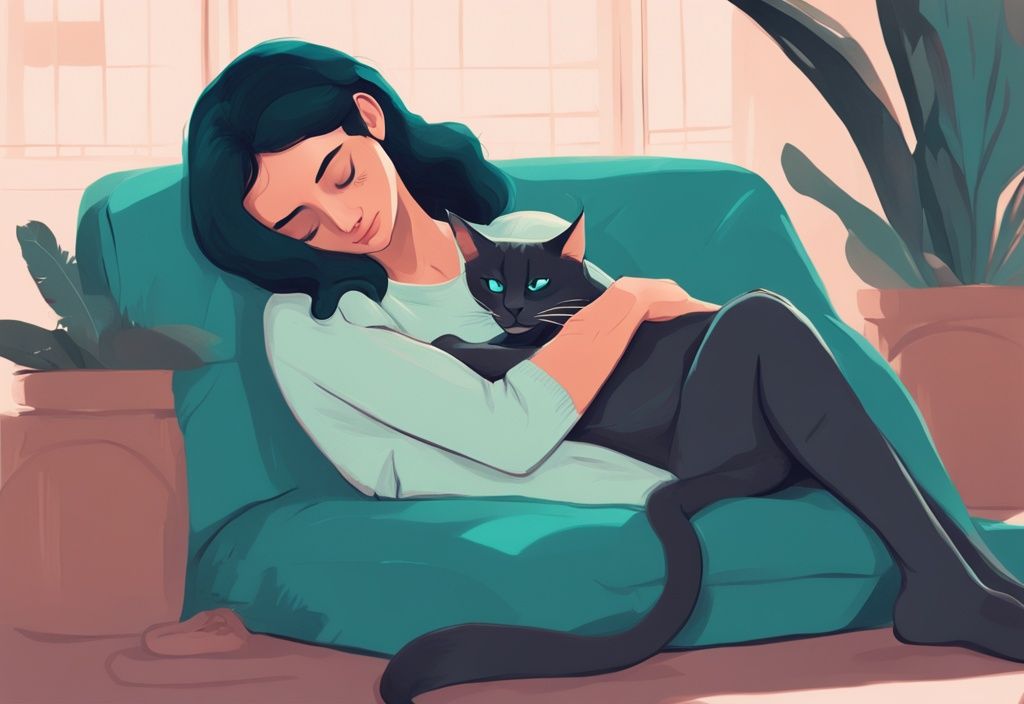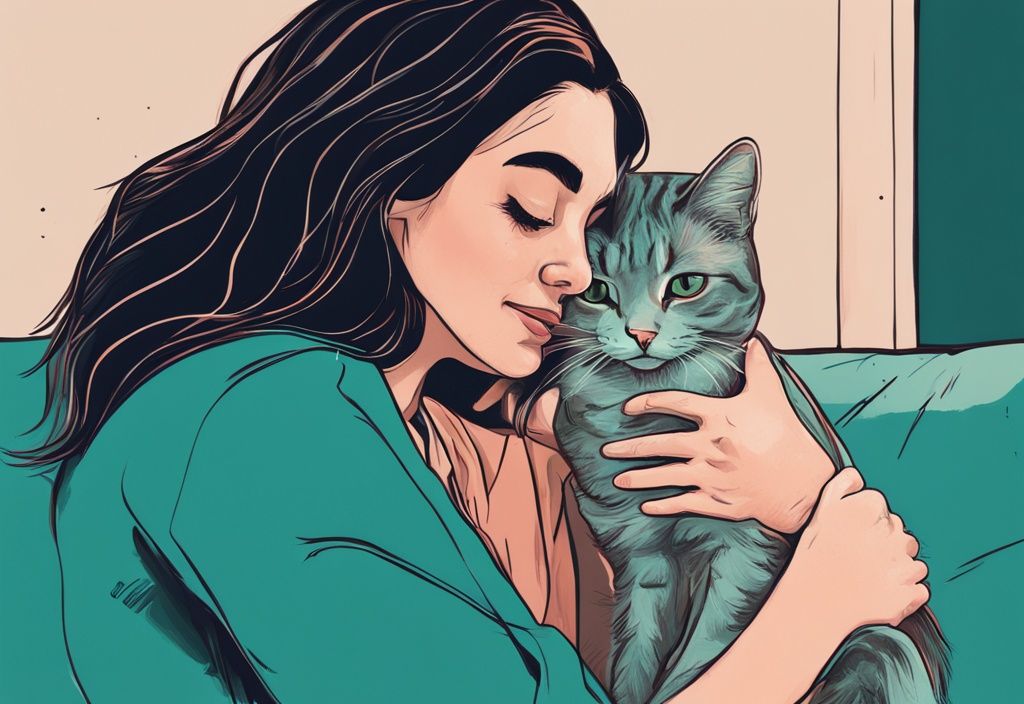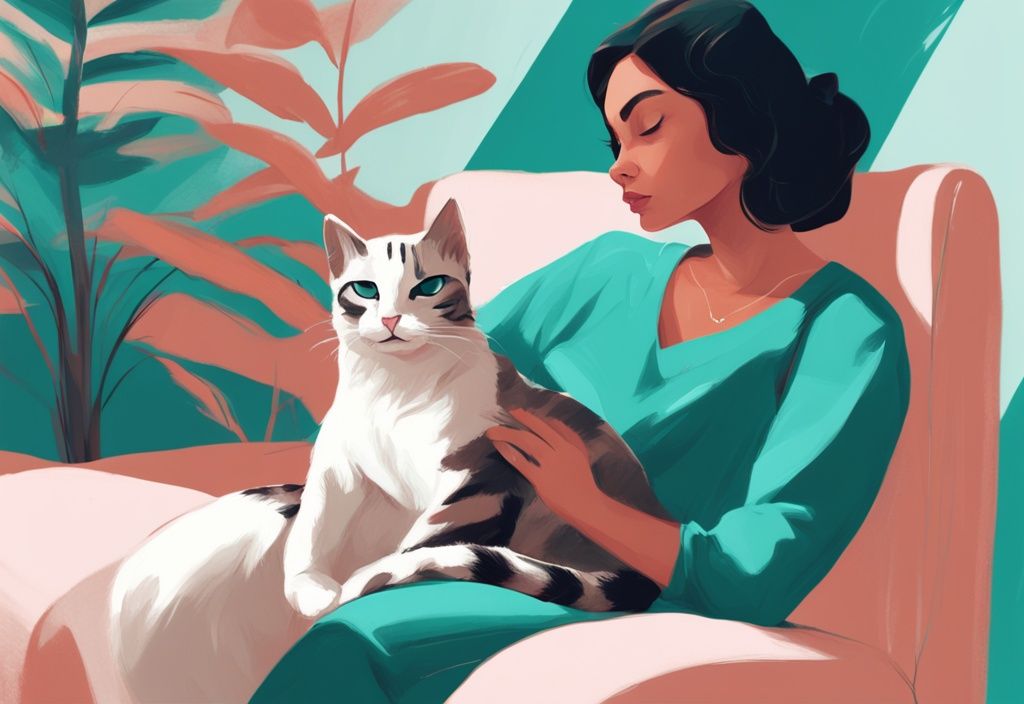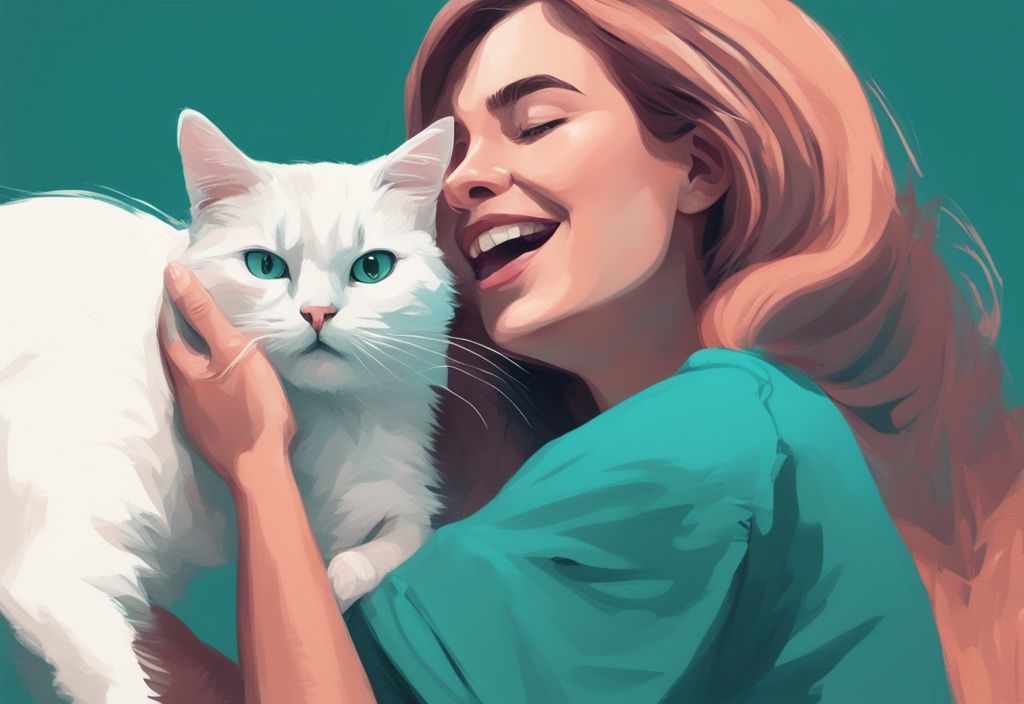Ever looked down to see Whiskers, I mean, your kitty, curling around your ankles purring like a freight train gone wild, and wondered, “What’s gotten into Mr. Independent?” Glad you asked! Cats can become unusually affectionate due to numerous factors such as aging, hormonal changes, or yep, the scary health issues! But no need to panic, let’s unravel this furry mystery, shall we?
In our chat today, we’ll dive into these known causes and help you decipher your cat’s sudden shift from aloof ruler to affectionate housemate. Plus, I’ll share some tips to keep your new best friend happy and healthy – without losing your sanity or your lap space!
So, fellow pet-aholic, ready to decode your cat’s sudden clinginess? I promise it’ll be as fun as a kitty laser tag playdate – now let’s get started, shall we?
Is Your Cat Suddenly More Affectionate? Top Reasons Explained
Cats can be full of surprises, and one of those is when they become extra cuddly out of nowhere. Ever wondered, “Why is my cat being so affectionate all of a sudden?” Let’s dive into some possible reasons.
Impact of Aging on Cat’s Behavior
Understanding the Connection between Aging and Affection
As your cat ages, you might notice them slowing down and becoming more of a lap cat. Aging can often result in a loss of independence, prompting cats to seek more interaction and comfort from their humans. Their joints might get a bit creaky from arthritis, making them crave a little extra TLC from you.
Aging and Sensory Declines: Link to Increased Affection
Have you noticed your older cat being extra clingy? Sensory declines such as diminished vision and hearing often make older cats more reliant on their owners. Conditions like dementia can make them feel lost and confused, leading to increased clinginess. It’s their way of finding comfort and reassurance in an ever-changing world.
Does Hormonal Changes Make Your Cat More Affectionate?
Effect of Hormonal Fluctuations in Unneutered Cats
Hormonal changes can have a huge impact on your cat’s behavior. Female cats in heat become notably more affectionate due to hormonal surges. You might find your unneutered male cat also acting extra cuddly, a behavior driven by his own hormonal influences.
Why Your Pregnant Cat May Be More Affectionate
Pregnant cats experience substantial hormonal changes, making them seek out more attention and comfort. You’ll likely see your mama-to-be cat look for extra affection and security, needing that extra love and support during this significant time.
Stress and Anxiety Might Make Your Cat Clingier
Common Stressors in Cats: A Closer Look
Changes at home can make your cat feel wobbly. New household members, changes in routine, or the loss of another pet can stress them out. Even new pets, rearranged furniture, adjusted schedules, or loud noises can elevate stress levels, causing your kitty to seek solace in your affection.
Coping Mechanisms of Cats: Using Affection to Ease Stress
When stressed, many cats turn to their owners for a sense of safety and comfort, becoming more affectionate as a coping mechanism. Seeking closeness and reassurance helps ease their anxiety. In more serious cases, veterinarians may recommend medications or treatments to help manage your kitty’s stress effectively.
Could Health Issues Be Causing Your Cat’s Increased Affection?
Hyperthyroidism and Increased Activity in Cats
Sometimes increased affection can signal underlying health issues. Hyperthyroidism, for example, revs up a cat’s metabolism, leading to heightened activity and more clinginess. Your cat might seek out more interaction and comfort from you as part of this condition.

Is Your Cat’s Diabetes Making it More Affectionate?
Diabetes in cats often brings about changes in behavior, including increased affection. Cats with diabetes might feel constant hunger and discomfort, making them turn to you for extra support and comfort. If you notice these changes, a visit to the vet for proper diagnosis and treatment is a must.
Behavioral and Environmental Factors
Understanding what’s going on in your cat’s environment and routine can shine a light on sudden shifts in their affection levels. Let’s dive a little deeper into these potential influences.
Does a Change in Routine Affect Your Cat’s Affection Levels?
Changes in daily routine can have a significant impact on your cat’s behavior. If you’ve recently modified your schedule or daily activities, you might be wondering, “why is my cat being so affectionate all of a sudden?” Cats are creatures of habit. Any disruption to their routine can make them feel insecure or stressed. In response, they may seek extra attention or bonding time with you to regain a sense of security. Maintaining a consistent routine is crucial in minimizing stress and ensuring your cat feels safe and comfortable.
Why Your Cat Might Become More Affectionate After You’ve Been Away
Upon returning home after being away, you might notice an unexpected surge in your cat’s affectionate behavior, making you ponder, “why is my cat being so affectionate all of a sudden?” Cats often express joy or relief at the return of their owner through increased affection. This behavior reflects their attachment to you and their subtle way of showing they missed you.
To help your cat settle back into their usual behavior, consider engaging with them through extra playtime or dedicating additional attention. This reinforces their sense of security and well-being.
New Family Members or Pets: A Trigger for Increased Affection?
Introducing new family members, pets, or even changes in household dynamics can turn your usually independent feline into a clingy companion, leading you to wonder, “why is my cat being so affectionate all of a sudden?” Cats may become more affectionate as a way to ensure they still hold a significant place in your life amidst these changes.
They might also sense emotional shifts such as a partner’s pregnancy, making them more attentive and affectionate in response. Providing reassurance and maintaining regular interaction can help your cat adjust to these new circumstances, ensuring their emotional needs are met.

When Should You Consult a Veterinarian?
Understanding when to seek veterinary advice for your cat’s sudden affectionate behavior is crucial for their health and well-being.
The Role of Veterinary Consultation in Alleviating Behavioral Changes
Have you ever caught yourself puzzled, thinking, “Why is my cat being so affectionate all of a sudden?” Sometimes, this could be more than just a change in your cat’s mood. Potential medical reasons behind this abrupt shift often require a chat with your vet to rule out underlying health issues.
If you’re noticing more than just extra snuggles—like changes in eating and sleeping habits, unexplained aggression, or too much grooming—it might indicate a deeper problem that needs professional attention. When your cat’s new-found affectionate behavior sticks around for longer than a few days, it’s time for a vet visit to make sure there’s no sneaky health problem lurking in the background.
Interpreting Your Cat’s Behavior: What to Look for?
So, your cat’s sudden affection has you scratching your head? Keep an eye on their overall behavior for clues. Spot any changes in munching habits? Increased or decreased appetite might hint at digestive issues or other health hiccups.
Excessive grooming? That could be stress or a skin condition waving a red flag. If you’re curious about how to stop dog shedding home remedy solutions, addressing the root cause can make a difference. And don’t miss those shifts in sleeping patterns; they might signal discomfort or illness. Oh, and watch for any sudden bouts of aggression or withdrawal; these can be telltale signs of hidden physical or mental health concerns. Consistent monitoring is your best buddy here, playing a crucial role in early detection and timely medical intervention.
Emergency Signs in Cats: When to Seek Help?
Knowing when to hit the panic button for your feline friend is essential. Struggling to breathe, puking excessively, or extreme lethargy are major red flags screaming for immediate vet care. Sudden weight loss? Another biggie that might point to serious health issues.
Any dramatic shift in behavior, especially when it comes with physical symptoms, should get you racing to the vet. Acting quickly on these urgent cues can seriously affect your cat’s health outcomes.

Frequently Asked Questions
Is My Cat Becoming More Affectionate Because They Feel Neglected?
Has Whiskers been extra cuddly lately? Your cat’s newfound affection could be a call for more attention. Imagine your cat as a small, furry alarm clock demanding some quality time. By spending more moments petting and playing with your cat, you’re essentially telling them, “I see you, I love you.” A nice balance between showing love and allowing independence ensures that Whiskers feels both cherished and secure.
Are Some Cat Breeds More Affectionate Than Others?
Absolutely! Ever noticed how a Ragdoll can turn into a puddle of purrs in your lap? Some breeds, like Ragdolls, Maine Coons, and Siamese, are naturally more affectionate. But even if your aloof feline suddenly becomes a love bug, it might just be them showing their unique personality traits. Remember, every cat is a purrsonality of its own!
Should I Be Concerned If My Cat Suddenly Becomes Clingier?
Sudden changes in behavior are always worth a closer look. If Whiskers starts shadowing you like Max does when he sniffs treats, it might be time for a vet visit. Sometimes, kitties get clingier to tell us something important. While it’s often nothing serious, staying alert for other symptoms can help catch any possible issues early. Trust your gut, and when in doubt, get the vet’s opinion.
Conclusion
Understanding why your cat is being so affectionate all of a sudden can help you provide the best care for your feline friend. Ever noticed your kitty becoming extra snuggly out of nowhere? Well, there are several reasons behind this sudden surge in affection, ranging from aging and hormonal changes to stress and health issues.
Aging can lead cats to slow down and seek more companionship, so it’s essential to give them extra TLC as they age. For more information on caring for older cats, check out this resource on loving care for older cats. Older cats might require more interaction with their owners due to a loss of independence or health conditions like arthritis. This makes them prefer comfort and security. Additionally, sensory declines, such as vision or hearing loss, and even dementia, can cause older cats to become clingier as they rely more on their owners for reassurance.
Hormonal changes also play a significant role in feline behavior. Unneutered cats, especially females in heat, often exhibit increased affection due to hormonal fluctuations. Pregnant cats? They may also become more affectionate, seeking comfort and support during their pregnancy.
Stress and anxiety can make cats clingier too. Changes in their environment, such as new people, pets, or alterations in routine, can cause stress. In these situations, cats often turn to their owners for security, using affectionate behavior as a coping mechanism to ease their anxiety.
Health issues should not be overlooked. Conditions like hyperthyroidism and diabetes can lead to increased affectionate behavior. Hyperthyroidism increases activity levels, sometimes making cats appear more clingy. Diabetes, on the other hand, can cause cats to seek more comfort due to constant hunger and illness-related discomfort.
Consulting with a veterinarian is crucial whenever there is a sudden change in your cat’s behavior. A vet can help rule out any medical causes and provide appropriate treatment if necessary. Maintaining consistent affection and routines also plays a vital role in ensuring your cat feels secure and loved, strengthening your bond.
In conclusion, whether it’s due to aging, hormonal changes, stress, or health issues, understanding why your cat is being so affectionate all of a sudden can help you manage their needs more effectively. This knowledge allows you to provide the proper care, ensuring your feline companion remains happy and healthy.
